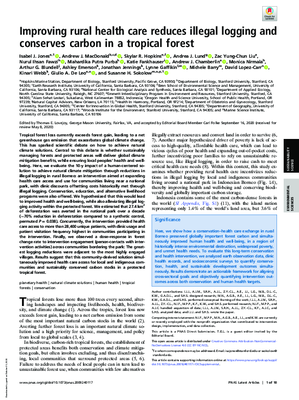Improving rural health care reduces illegal logging and conserves carbon in a tropical forest

Author(s): Isabel J. Jones, Andrew J. MacDonald, Skylar R. Hopkins, Andrea J. Lund, Zac Yung-Chun Liu, Nurul Ihsan Fawzi, Mahardika Putra Purba, Katie Fankhauser, Andrew J. Chamberlina, Monica Nirmala, Arthur G. Blundell, Ashley Emerson, Jonathan Jennings, Lynne Gaffikin, Michele Barry, David Lopez-Carr, Kinari Webb, Giulio A. De Leoa, and Susanne H. Sokolow
Publication Date: 2020
DOWNLOAD FILETropical forest loss currently exceeds forest gain, leading to a net greenhouse gas emission that exacerbates global climate change. This has sparked scientific debate on how to achieve natural climate solutions. Central to this debate is whether sustainably managing forests and protected areas will deliver global climate mitigation benefits, while ensuring local peoples’ health and wellbeing. Here, we evaluate the 10-y impact of a human-centered solution to achieve natural climate mitigation through reductions in illegal logging in rural Borneo: an intervention aimed at expanding health care access and use for communities living near a national park, with clinic discounts offsetting costs historically met through illegal logging. Conservation, education, and alternative livelihood programs were also offered. We hypothesized that this would lead to improved health and well-being, while also alleviating illegal logging activity within the protected forest.


